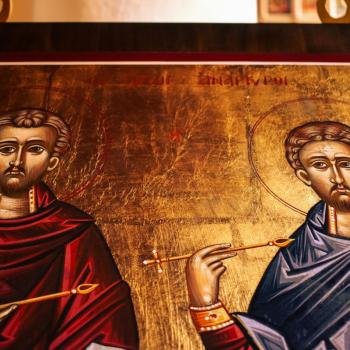Is America A Righteous Nation?
Matthew 25:31-46
A sermon by The Rev. Dr. Rodney Wallace Kennedy
A biblical text at times feels as new as morning dew. Other times it feels so ancient that we can’t imagine it. Today’s gospel reading about judgment of sheep and goats feels really ancient. What are we to make of dividing the sheep from the goats? In our culture, say the word, “GOAT,” and a debate breaks out as to whether Michael Jordan or LaBron James is the “Greatest of All Time.”
Moving from goats and sheep, I have a question that I think has the ring of truth considering our just completed American Thanksgiving celebration: “Is America a Righteous Nation?” Like showing the murderer in the opening of a detective mystery, the answer is “No!” America is not a righteous nation. The church has wrapped itself in the American flag.

The answer to that question lies in our gospel reading for today: “All the nations will be gathered before the King.” And he will judge nations as righteous or unrighteous. The righteous nations: “I was hungry and you gave me food, I was thirsty and you gave me something to drink, I was a stranger and you welcomed me, I was naked and you gave me clothing, I was sick and you took care of me, I was in prison and you visited me.”
There are preachers who dare to claim America was born a Christian nation and is a Christian nation still. They are wrong on both counts. If America is Christian, why are we so enthralled with free-market fundamentalism and the Market God? If America is Christian, why are we so addicted to aggressive militarism? If America is Christian, why are we flirting with a rising authoritarianism? (Cornel West, Democracy Matters) The answer should be clear. We are a polytheistic people, a bunch of practical atheists pretending to worship God while grasping for worldly power. America is not a Christian nation and today we are going to discover that truth in Scripture and history.
Righteousness, it seems, is the chameleon of theological words. What passes for righteousness in America today is “being right” with might. If you have the vote, you can dictate what is righteous. When we start deciding who is righteous based on polls, we should know we have a problem.
Some Christians believe we are a righteous nation because they are clinging with all their might to the moral certitudes of the conservative wing. Other Christians believe we are a righteous nation because they are clinging with all their might to the social programs of the left. Righteousness doesn’t come from a secular political commitment. Righteousness is not about being for or against social issues. It’s not about pietism or external religion or praise songs. Whichever party we belong to, however dear and precious we hold it all to be, none of it is going to make us righteous people. Only God decides what is righteous.
Reality check: The nations will be judged.
What a shock to the sacred doctrine of individualism. Matthew says, “The nations are gathered.” Please feel free to be as literal as possible here. Nations will be judged for how they have treated the least of these. We treat the rich like gods, but how do we treat the poor? James has a scathing reminder of how we fawn over the rich and tell the poor to sit in a corner. I bet some of you have always said, “Jesus is telling each one of us that we should each do our part to feed the hungry and take care of the sick. He’s not talking about the government.” Well, “All the nations will be gathered before him.”
Reality check: Jesus has prepared a final examination for the nations.
Imagine sitting for your final examination for the Ph.D. You open the envelope, unfold the page of questions and there’s only one question: “How did we respond to human need?” (Fred Craddock) Across our land, the cries of the least of these ring: Mommy, I’m hungry. Daddy, I’m cold. Grandma, my tummy hurts. Are we sleeping here tonight? How did we respond to human need?
God has prepared an economic program for meeting the needs of the least of these: It’s called Jubilee. Every 50 years, the trumpet sounds and the rich people give back to the poor people all they have accumulated. When Jesus announced his kingdom, he said, “I am the Jubilee.” Righteousness is tied to Jubilee.
In a nation where the NY Stock Exchange bell rings every day at closing time, we are deaf to the sounding of the Jubilee trumpet. Jubilee is the way to being a righteous nation. Since there has never been a Jubilee, we are not a righteous nation.
Reality check: Righteousness is meeting human need.
How are we supposed to take care of all these needy people? Well, our story insists that righteousness means meeting human need. And that takes money. What in the world does money have to do with righteousness?
Almsgiving Is Righteousness

Here then are two stunning theological principles: The nations are to be judged by how well human need is met. Righteousness is a matter of serving people and almsgiving. Jesus insists that the good man who keeps all the commandments lacks one thing: “Give away all your money to the poor and come follow me.” Those are the instructions. Righteousness has a direct relationship with almsgiving.
Perhaps a good Lutheran would think I sound like Tetzel, master sales rep for “indulgences.” Well, the tradition of almsgiving as righteousness is deeply embedded in Judaism and the early Christian church. I recently read Gary Anderson’s book, Sin: A History. Anderson points out that in the book of Daniel there’s a story of Nebuchadnezzar having a dream of the cutting down of a giant tree with only the stump left. Daniel tells the king that he is that tree. Daniel then gives the king some advice: “Therefore, O King, may my advice be acceptable to you: Redeem your sins by almsgiving (sidqa) and your iniquities by generosity to the poor; then your serenity may be extended.” The NRSV translates the Hebrew sidqa as righteousness but note the parallelism in the text between sidqa and the phrase “be generous to the poor.” In Hebrew the meaning of the first phrase is defined in the second phrase. So righteousness is here defined as almsgiving. I’m going to wait a moment and let this sink in: almsgiving is righteousness.
I’m not saying we can buy our way to heaven because only God can make us righteous, but “the importance of giving for the purposes of reconciliation is nearly universal in the early church.
It is a matter of righteousness. Giving is a public testimony that we belong to God. We are returning to God what already belongs to God. We give for the benefit of others not for our benefit. It counts as righteousness.
A nation can’t be righteous if it doesn’t care for the poor, the hungry, the thirsty, the prisoners, and the sick. Righteousness is tied to our willingness to give. Our giving is an expression of the free gift of righteousness from God. Here’s the correct order: God gives us the gift of righteousness: “By grace we are saved.” Then we give that righteousness in the form of alms for the poor “saved in order to do good works.” Any order that has all the money accumulating in our account with no giving can’t be righteousness but is unrighteousness.
We are called to be a righteous nation. Therefore, serve human need and give alms. That’s a good start. Amen.













